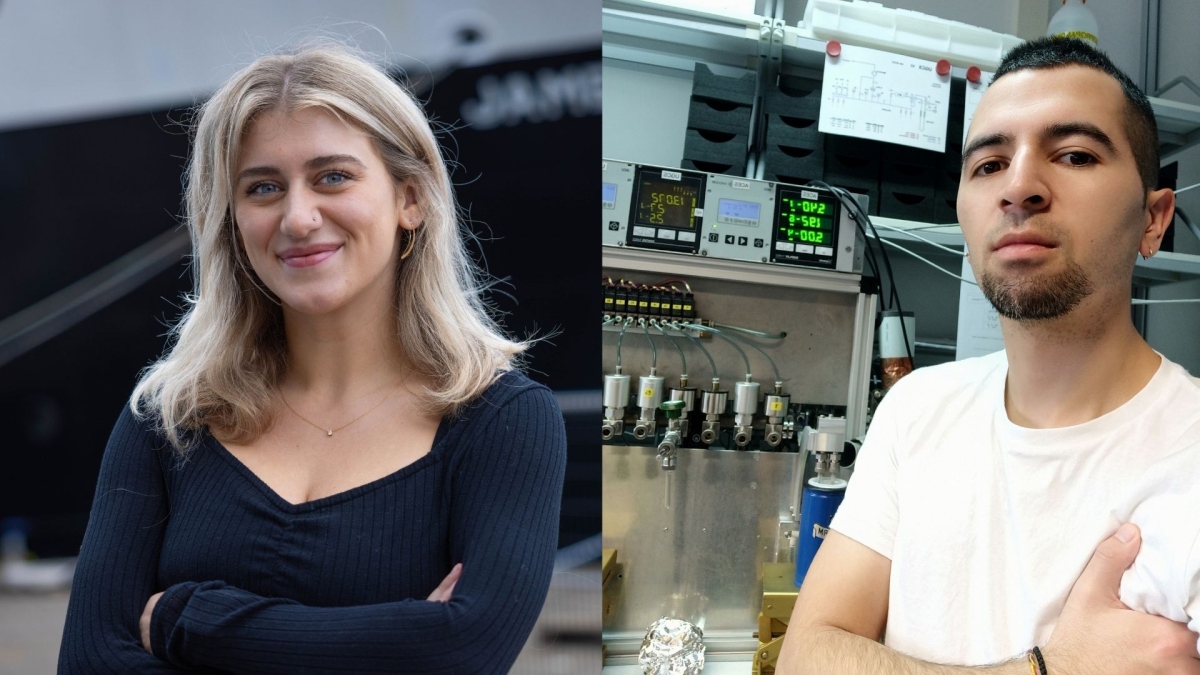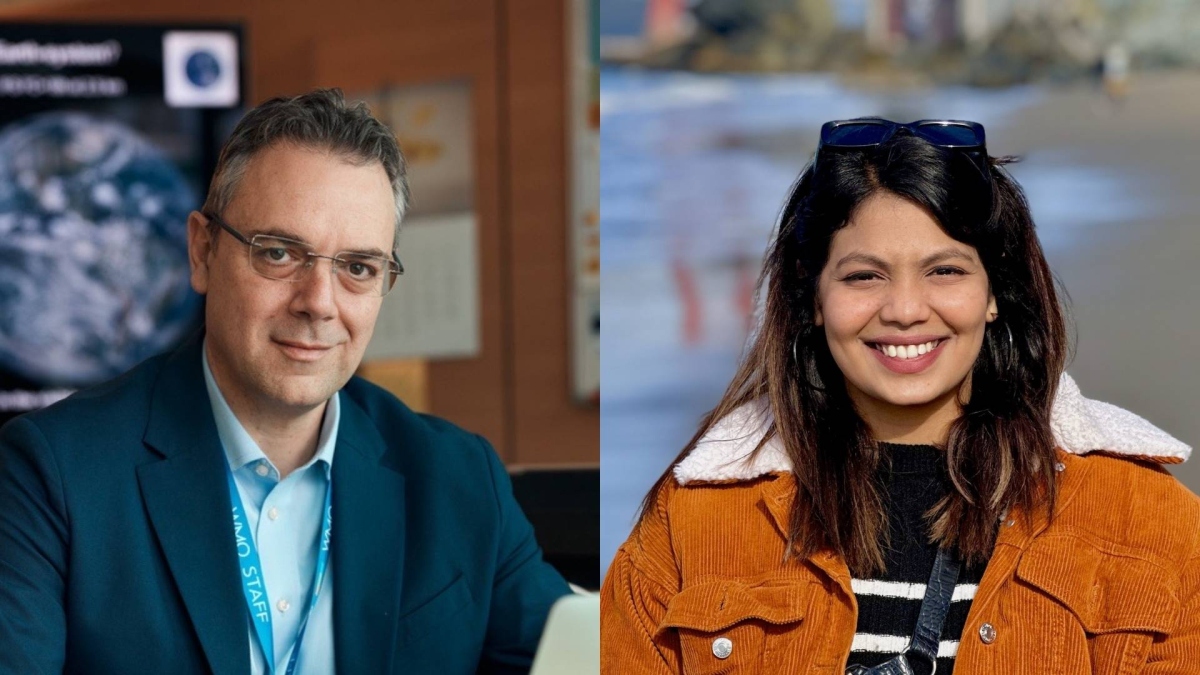The plenary presentations at ICOS Science Conference 2024 reflect themes as varied as satellite remote sensing data of greenhouse gases, enhancing the ocean carbon sink, and services for better climate policy. We spoke with this year’s plenary speakers to get a preview of their talks.
Carbon cycle: new technologies and tools for measurement and analysis
Understanding the carbon cycle is essential for effective climate change mitigation action. High precision measurements and good quality data are critical for this. Emily Hammermeister and Andrés Tangarife-Escobar are both studying the carbon cycle – Emily focuses on the ocean domain, while Andrés is exploring boreal forests.
“Collecting and analysing high-resolution ocean carbonate system data is essential in understanding the global carbon cycle and its role in climate regulation,” says Emily. Her plenary presentation will cover recent successful deployments of autonomous in situ sensors and platform technologies. “Our community’s advancements in ocean observing technology are making significant strides in expanding ocean carbonate observations,” Emily explains. “With these advancements come learning curves, but they have the potential to unlock new understanding on the processes that control the carbon cycle in the ocean.”
Andrés approaches the theme by studying carbon cycling in different ecosystem pools of a boreal forest. Andrés’s results showed that carbon presents fast cycling rates (months to years) in live biomass and intermediate cycling rates (years to decades) in dead biomass and wood.
In his plenary talk, Andrés will get us acquainted with using isotopic disequilibrium of radiocarbon in understanding the fate and timescales of carbon cycling in a boreal forest ecosystem. His take-home message is that boreal forest soils may not be efficient for short-term carbon sequestration. “Most of it is cycled in the order of days to decades from vegetation and the soil organic layer. Only minimal amounts of new carbon are incorporated and stabilized in mineral soils over long timescales,” Andrés explains.

Methane: observing, measuring, and developing tools for greenhouse gas research
Along with understanding the carbon cycle, observing and measuring changes in methane emissions is a key factor in helping us recognise the biggest global emitters and better target mitigation actions. Plenary talks by Thomas Colligan, Ilse Aben, and Malavika Sivan will dive into observing, measuring and developing tools for understanding methane fluxes. Gianpaolo Balsamo will explore the monitoring and reporting of greenhouse gases, and the importance of standardised data.
In his plenary talk, Thomas Colligan will present his team’s research on methane and carbon dioxide fluxes, and the mechanisms behind regional carbon flux anomalies. “We provide evidence of increasing modeled biospheric emission anomalies of net biome production and methane in different regions of the world and tie them to climatic variables”, says Thomas. ”The near-real-time capability of our modeling system allows rapid quantification and attribution of these anomalies, leading to the possibility of rapid deployment of measurement and verification systems”.
Ilse Aben studies satellite observations of methane super emitters to support fast mitigation of large methane sources.
Ilse’s main message to her audience is that satellite observations of methane super emitters are an important tool in supporting the fast mitigation of large methane ‘leaks’. “Combining multiple satellites with observations at different spatial scales is already used by the UN’s International Methane Emission Observatory (IMEO) in their Methane Alert Response System (MARS) in support of the Global Methane Pledge”, Ilse outlines. She adds that satellite observations of methane can help local authorities in supporting mitigation actions by providing methane emissions data from for example waste sites. “Intercomparisons and validation of emission detection and quantification of different satellite methane products is an important on-going effort in support of those mitigation actions,” Ilse concludes.
Like Ilse, Malavika Sivan is similarly contributing to understanding methane sources and sinks. In her plenary talk, Malavika will present analysis of Greenland’s firn air samples, which were used by her team to devise a two-box atmosphere model. “Reconstructing the evolution of clumped isotopic composition over the past 25 years from firn air samples marks an important step in constraining the clumped isotope budget,” explains Malavika, “These developments provide a foundation for future studies on atmospheric methane using clumped isotopologues. Further model evaluation indicates that continuing such measurements will be valuable for studying future methane trajectories.”
In his plenary talk, Gianpaolo Balsamo will explore the World Meteorological Organization’s efforts in building a global network to monitor and report on greenhouse gas emissions - the Global Greenhouse Gas Watch (G3W). “This infrastructure builds on the weather enterprise and aims at supporting the data sharing of the in-situ surface-based observations, the space-based satellites data, and the global operating centres that integrate models and observations into gridded data products,” outlines Gianpaolo. He emphasises the importance of accessible and standardised data in advancing scientific research.

From city to continental scales: gathering data and building models for better science and services
Having the correct tools to access and gather reliable data is important in understanding how greenhouse gases behave in different regions. Emma Schoenmakers and Yolandi Ernst are researching ways of strengthening regional data and models with the purpose of developing better services.
In her plenary presentation, Yolandi will discuss the greenhouse gas budget for Africa (2010–2019), which was developed by her research team. This study revealed that Africa has switched from being a global net carbon sink to a net carbon source. Yolandi calls for urgent carbon-neutral socio-economic development for the continent. Yolandi also highlights the growing population of Africa and intensified climate change effects on the continent, which create significant pressure for food and energy security.
“Addressing this challenge will require significant global support and financing to (1) transition reliance on fossil fuels to green energy alternatives and (2) find innovative ways to protect, manage and restore landscapes that can store carbon, while increasing food security and improving human livelihoods,” Yolandi says. Her research highlights “the importance of increased in-situ greenhouse gas observations and developing regional models with Africa-specific parameterization”.
Moving from the continental to the city scale, various cities lack the resources for climate observations and measurements. In her upcoming plenary talk, Emma Schoenmakers will dissect the “key challenges and successes as well as uncertainty associated with downscaling European-scale emission inventories to the city scale”. Emma’s research is based on the ICOS Cities (PAUL) project, and involves a comparison of urban greenhouse gas emissions inventories in Zurich, Munich and Paris.
“I would like to emphasise the importance of a strong inter-city co-operation to promote knowledge exchange as well as the opportunities made possible by the provision of high-resolution emission tools to European cities who do not (yet) have access to the infrastructure needed to monitor emissions and climate targets beyond national reporting”, Emma continues.
—————————————————————————
Join us at ICOS Science Conference 2024 to hear the complete plenary presentations and discover the newest research on greenhouse gas observations. Read more and register here: https://www.icos-cp.eu/news-and-events/science-conference/icos2024sc/registration
Answers have been edited for the purpose of length and clarity.